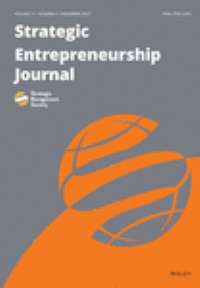家族CEO辅导与CEO继任绩效
IF 6.3
2区 管理学
Q1 BUSINESS
引用次数: 0
摘要
虽然现有的研究已经广泛地研究了首席执行官继任的后果,但我们探索了家族首席执行官指导(从即将离职的家族首席执行官到年轻的家族领导人)作为家族企业继任后绩效的潜在驱动因素的概念。利用管理理论并使用1787家意大利公司的数据集,我们发现家族CEO指导对继任后的财务绩效有积极影响。然后,我们论证并实证证实,家族CEO辅导的绩效效益会因董事会中非家族成员的存在而增强,但会因行业动荡而减弱。最后,我们讨论了我们的发现对CEO辅导、CEO继任和家族企业绩效研究的意义。管理总结家族企业要想在几代人之间兴旺发达,就必须处理好首席执行官(CEO)继任的诸多复杂问题。克服这一挑战的一个方法是让一位即将离任的家族领袖为年轻的家族领袖提供指导。我们对2003年至2016年间1787家经历过CEO继任的意大利家族企业的研究表明,家族CEO辅导在继任后推动了更好的企业绩效,尤其是当董事会中有大量非家族董事以及公司处于低波动性行业时。本研究通过整合家族CEO指导作为继任后财务绩效驱动因素的作用,增强了对CEO继任的理解。本文章由计算机程序翻译,如有差异,请以英文原文为准。
Family CEO mentoring and post‐CEO succession performance
Research SummaryWhile extant research has studied extensively the consequences of chief executive officer (CEO) succession, we explore the concept of family CEO mentoring (from a departing family CEO to a younger family leader) as a potential driver of post‐succession performance in family firms. Drawing on stewardship theory and using a data set of 1787 Italian firms experiencing a CEO succession over 14 years, we show that family CEO mentoring positively influences post‐succession financial performance. We then argue and empirically confirm that the performance benefit of family CEO mentoring is enhanced by the presence of nonfamily members on the board but is dampened by industry turbulence. We conclude by discussing the implications of our findings for research on CEO mentoring, CEO succession, and family business performance.Managerial SummaryTo thrive across generations, family firms need to navigate the many complexities of chief executive officer (CEO) succession. One way to overcome the challenge is to have a departing family leader who provides mentoring to the younger family leader. Our examination of 1787 Italian family firms that experienced CEO succession in the period 2003–2016 suggests that family CEO mentoring drives better post‐succession firm performance, especially when there is a high presence of nonfamily directors in the boardroom and when the firm operates in low‐volatility industries. This study enhances the understanding of CEO succession by integrating the role of family CEO mentoring as a driver of post‐succession financial performance.
求助全文
通过发布文献求助,成功后即可免费获取论文全文。
去求助
来源期刊

Strategic Entrepreneurship Journal
Multiple-
CiteScore
11.10
自引率
1.60%
发文量
31
期刊介绍:
The Strategic Entrepreneurship Journal is a research journal that publishes original work recommended by a developmental, double-blind review process conducted by peer scholars. Strategic entrepreneurship involves innovation and subsequent changes which add value to society and which change societal life in ways which have significant, sustainable, and durable consequences. The SEJ is international in scope and acknowledges theory- and evidence-based research conducted and/or applied in all regions of the world. It is devoted to content and quality standards based on scientific method, relevant theory, tested or testable propositions, and appropriate data and evidence, all replicable by others, and all representing original contributions. The SEJ values contributions which lead to improved practice of managing organizations as they deal with the entrepreneurial process involving imagination, insight, invention, and innovation and the inevitable changes and transformations that result and benefit society.
 求助内容:
求助内容: 应助结果提醒方式:
应助结果提醒方式:


